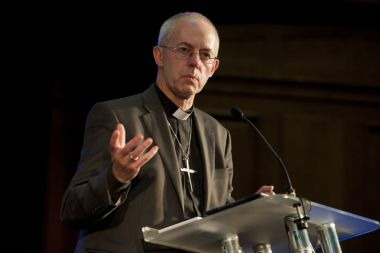Justin Welby: How to demonstrate the love of the Trinity

The Archbishop of Canterbury today used his Trinity Sunday sermon to criticise Christians who live immoral lives, disrupt unity and attack each other.
The Most Rev Justin Welby outlined the Christian witness that lies at the heart of the Trinity and called believers away from behaviour that gets in the way of faith.
Preaching at Muen Church in Shanghai, China, where he is currently on a 10-day visit, he said that Christians who behave badly individually or as a community, whether by immorality, disunity, mutual attack or other behaviour, witness to people that God is bad. "Christians who live with all the pressures of life and yet show that in Christ they find peace and hope give a witness to His truth and love," he said.
He urged the usefulness of prayer. "Prayer is not a psychological trick to make us feel better. In prayer God reshapes our wills to fit what He wants and enables us to find peace."
He said he prays every day for his children grandchildren, and said almost nothing has parents lying awake at night like a child in trouble. Referring to his own family he said: "They have many joys and many sorrows, but even in sorrow God has showed He stands with us. In our lives as a family we have known very deep trauma in the family, yet even then we were sustained by the presence of God through the Holy Spirit and by the love of God mediated through the church - the community of God."
Another area of pressure was work. "One of the things that strikes me about China is how hard people work and the pressure they are under. Pressure includes the pressure from within us to succeed."
He warned against succumbing to the temptations of the material world. "Ambition is good, but it can become an idol that pushes Christ from our lives. Our worship is only Christ."
And quoting St Peter, he explained the key to effective evangelism, which is "not in aggressive shouting at people or any other form of manipulation or disruption" but in lives lived so clearly that people would ask why the Christian lived in such a way.
He described the concept of the Trinity as "community, perfect in love and acceptance and giving out, going out. We are to be like that in the church."
He concluded: "Where there are Christians, people should know that the hungry will be fed, those who are hurting will be healed, those who are lonely will be loved, those who are in despair will be brought hope, those who are disruptive will be taught to do the right thing and to love their country and society.
"In such a community the life of the Trinity is made visible, and in such a community we find our sure defence against all that life can throw at us."











